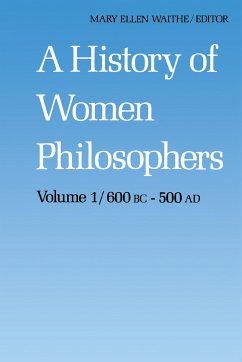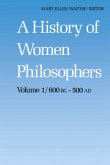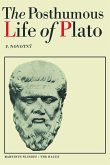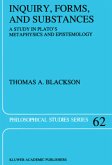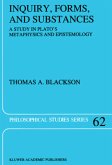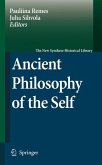to Volume 1.- 1. Early Pythagoreans: Themistoclea, Theano, Arignote, Myia, and Damo.- I. Themistoclea, Arignote, and Damo.- II. Theano of Crotona.- III. Myia; Notes..- 2. Late Pythagoreans: Aesara of Lucania, Phintys of Sparta, and Perictione I.- I. Aesara of Lucania.- (1) Text of On Human Nature.- (2) The Nature of Law and Justice.- (3) Aesara on Moral Psychology.- (4) Aesara and Physical Medicine.- (5) A Note about Feminism.- (6) The Principled Structure of the Soul.- II. Phintys of Sparta.- (1) Text of On the Moderation of Women,Fragment I.- (2) Women and Virtue.- (3) Women and Justice in the Home.- (4) Phintys¿ On the Moderation of Women,Fragment II.- (5) Women and Religious Observances.- III. Perictione I.- (1) Translation of the Text.- (2) Relationships and Moral Obligation.- (3) Moral Pragmatism and Faithful Wives.- (4) Physical Beauty and the Moral Disorder of Women.- (5) Virtue, Power, Class and Oppression.- (6) Idealism versus Pragmatism; Comments by Vicki Lynn Harper,.- (7) Women and Piety.- (8) Translation of the Text; Notes..- 3. Late Pythagoreans: Theano II, and Perictione II.- I. Theano II.- (1) Theano II to Euboule.- (2) Theano II to Nikostrate.- (3) Theano to Kallisto; Commentary by Vicki Lynn Harper.- (4) Spurious Texts.- II. Perictione II.- (1) Text of Sophias.- (2) Wisdom and Morality; Notes..- 4. Authenticating the Fragments and Letters.- I. The Forgery Hypothesis.- (1) In Favor of the Forgery Hypothesis.- (2) Consequences of the Forgery Hypothesis.- II. The Pseudonymy Hypothesis.- (1) Consequences of the Pseudonymy Hypothesis: The ¿Female Authority¿ View.- (2) Consequences of the Pseudonymy Hypothesis: The Dissident Archytan View.- III. The Eponymy Hypothesis:.- (1) The Problem with Names.- (2) The Doric Language.- (3) Perictione l¿s Ionic Prose.- (4) Phintys¿ On the Moderation of Women.- (5) Aesara of Lucania¿s On Human Nature; Summary; Notes..- 5. Aspasia of Miletus.- I. Background.- II. The Menexenus and Pericles¿ Funeral Oration.- III. Two arguments about the Menexenus.- IV. Aspasia and Sophistic Rhetoric; Conclusions; Notes..- 6. Diotima of Mantinea.- I. Distinguishing Diotima from Plato and Socrates.- (1) Diotima¿s Concept of Beauty.- (2) Diotima¿s Concept of hmmortality.- (3) The Independence of Eros from Reason.- (4) Summary.- II. The Tradition of Diotima as a Fictitious Character.- (1) The ¿Plato is Feminizing Philosophy¿ Argument.- (2) The ¿Socratic Wit¿ Argument.- (3) The ¿Plato as Novelist¿ Argument.- (4) The ¿No Ancient Evidence¿ Argument.- (5) Objections to Arguments.- III. The historical Diotima.- (1) Evidence from Plato.- (2) The Archeological Evidence.- (3) The Written Testimony.- (4) Two Modern Opinions on the Historicity of Diotima.- IV. In Support of Thesis B.- (1) Immortality, Transmigration, and Personal Identity.- (2) Eros and Reason.- (3) The Idea of Beauty.- (4) Summary; Notes..- 7. Julia Domna.- I. Julia Domna¿s Biography.- II. ¿The Philosopher Julia¿.- (A) Who were the Members of Julia¿s Circle?.- (B) Who were the Sophists?.- (C) What Philosophy did Julia study?.- (D) What Philosophy did Julia herself seem to Favor?.- III. Conclusion; Notes..- 8. Makrina.- I. Biography.- II. Makrina and the Spiritual Tradition.- (1) The Unity and Immortality of the Soul.- (2) Ascetism.- (3) Gnosticism.- (4) Gnosticism, Christianity, and the Inferiority of Women.- III. Makrina and Woman¿s Soul.- (1) Makrina on the Soul and the ?¿ (Pathe).- (2) The Traditional Views of Women¿s Souls.- (3) Mary, the Mother of Christ in Patristic Literature.- (4) Woman and Anthropomorphic Thinking about God.- IV. Makrina on Creation, Reincarnation, and Resurrection.- (1) Makrina and the Plotinian Tradition.- (2) Makrina and the Porphyryian View.- (3) Makrina and the Tradition of Philo of Alexandria.- (4) Makrina and the Reincarnation Doctrines; Notes..- 9. Hypatia of Alexandria.- I. Biography.- II. Teaching.- III. Works.- (1) Commentary on Diophantus¿ Arithmeticorum.- (2) Commentary to Book III of Ptolemy¿s Syntaxis Mathematica.- (3) Other Works; Summary; Notes..- 10. Arete, Asclepigenia, Axiothea, Cleobulina, Hipparchia, and Lasthenia.- I. Arete of Cyrene.- (1) Pain and Pleasure.- (2) Virtue and Hedonism.- (3) Hedonistic Moral Psychology.- II. Asclepigenia of Athens.- (1) Background.- (2) Metaphysics and Magic.- (3) Plotinus, Plutarch, Proclus.- III. Axiothea of Philesia.- IV. Cleobulina of Rhodes.- V. Hipparchia the Cynic.- VI. Lathenia of Mantinea; Notes..
`It is an extremely important book which brings together in one text contributions of women philosophers in ancient western thought. It is well organized, very readable, and conveys a sense of excitement about the material covered.'
P. Allen in RFR/DRF, vol. 18, no. 1
P. Allen in RFR/DRF, vol. 18, no. 1
`It is an extremely important book which brings together in one text contributions of women philosophers in ancient western thought. It is well organized, very readable, and conveys a sense of excitement about the material covered.'
P. Allen in RFR/DRF, vol. 18, no. 1
P. Allen in RFR/DRF, vol. 18, no. 1

